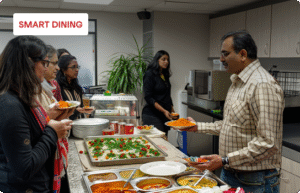- Our Blogs
A Collection of Ideas & Insights

- Our Blogs
A Collection of Ideas & Insights

- Office Cafeterias
Fueling Workplaces with Knowledge
Empowering workplaces with insights on meal management, budgeting, and quality control to enhance efficiency and satisfaction.
1. Introduction
In today’s fast-paced business world, knowledge is the driving force behind workplace innovation and efficiency. Organizations that prioritize learning and knowledge-sharing create an environment where employees feel empowered, engaged, and equipped to tackle challenges. But how can businesses cultivate such an ecosystem?
2. The Role of Knowledge in Workplace Growth
Knowledge is more than just information—it’s the key to smarter decision-making, problem-solving, and productivity. A well-informed workforce adapts to changes faster, fosters innovation, and drives overall company success. Businesses that invest in knowledge management gain a competitive edge by ensuring their teams stay ahead of industry trends.
3. Creating a Culture of Continuous Learning
To fuel workplaces with knowledge, companies must encourage a mindset of lifelong learning. This includes:
- Providing regular training programs
- Encouraging mentorship and peer learning
- Supporting employees in upskilling and professional development
When employees see learning as an ongoing process, they remain motivated to grow and contribute effectively.
4. The Role of Knowledge in Workplace Growth
Organizations can implement various tools to facilitate knowledge-sharing, such as:
- Digital Knowledge Bases: Centralized platforms where employees can access critical information
- Collaboration Tools: Platforms like Slack, Microsoft Teams, or Notion for real-time knowledge exchange
- Workshops & Webinars: Regular sessions to update employees on industry advancements
- Feedback Loops: Encouraging employees to share insights and best practices
5. The Impact of an Informed Workforce
A well-informed workforce leads to increased efficiency, improved teamwork, and greater job satisfaction. Employees who have access to the right knowledge feel more confident in their roles, reducing errors and boosting productivity. Moreover, knowledge-sharing strengthens company culture and promotes a sense of unity within the organization.
6. Conclusion
Fueling workplaces with knowledge is not a one-time effort—it’s a continuous process that requires dedication and the right strategies. By fostering a culture of learning, leveraging modern tools, and encouraging knowledge-sharing, organizations can create smarter, more innovative, and highly productive workplaces. The future belongs to those who learn, adapt, and grow together.
1. Introduction
In today’s fast-paced business world, knowledge is the driving force behind workplace innovation and efficiency. Organizations that prioritize learning and knowledge-sharing create an environment where employees feel empowered, engaged, and equipped to tackle challenges. But how can businesses cultivate such an ecosystem?
2. The Role of Knowledge in Workplace Growth
Knowledge is more than just information—it’s the key to smarter decision-making, problem-solving, and productivity. A well-informed workforce adapts to changes faster, fosters innovation, and drives overall company success. Businesses that invest in knowledge management gain a competitive edge by ensuring their teams stay ahead of industry trends.
3. Creating a Culture of Continuous Learning
To fuel workplaces with knowledge, companies must encourage a mindset of lifelong learning. This includes:
- Providing regular training programs
- Encouraging mentorship and peer learning
- Supporting employees in upskilling and professional development
When employees see learning as an ongoing process, they remain motivated to grow and contribute effectively.
4. The Role of Knowledge in Workplace Growth
Organizations can implement various tools to facilitate knowledge-sharing, such as:
- Digital Knowledge Bases: Centralized platforms where employees can access critical information
- Collaboration Tools: Platforms like Slack, Microsoft Teams, or Notion for real-time knowledge exchange
- Workshops & Webinars: Regular sessions to update employees on industry advancements
- Feedback Loops: Encouraging employees to share insights and best practices
5. The Impact of an Informed Workforce
A well-informed workforce leads to increased efficiency, improved teamwork, and greater job satisfaction. Employees who have access to the right knowledge feel more confident in their roles, reducing errors and boosting productivity. Moreover, knowledge-sharing strengthens company culture and promotes a sense of unity within the organization.
6. Conclusion
Fueling workplaces with knowledge is not a one-time effort—it’s a continuous process that requires dedication and the right strategies. By fostering a culture of learning, leveraging modern tools, and encouraging knowledge-sharing, organizations can create smarter, more innovative, and highly productive workplaces. The future belongs to those who learn, adapt, and grow together.
Boost Productivity with Meals
Providing meals for employees isn’t just a perk—it’s an investment in productivity, well-being, and company culture.
Creating Best Wedding Experiences
Providing meals for employees isn’t just a perk—it’s an investment in productivity, well-being, and company culture.
Boost Productivity with Meals
Providing meals for employees isn’t just a perk—it’s an investment...
Creating Best Wedding Experiences
Providing meals for employees isn’t just a perk—it’s an investment...
Upgrade Your Cafeteria Today
Many organizations still rely on outdated cafeteria management systems that...





